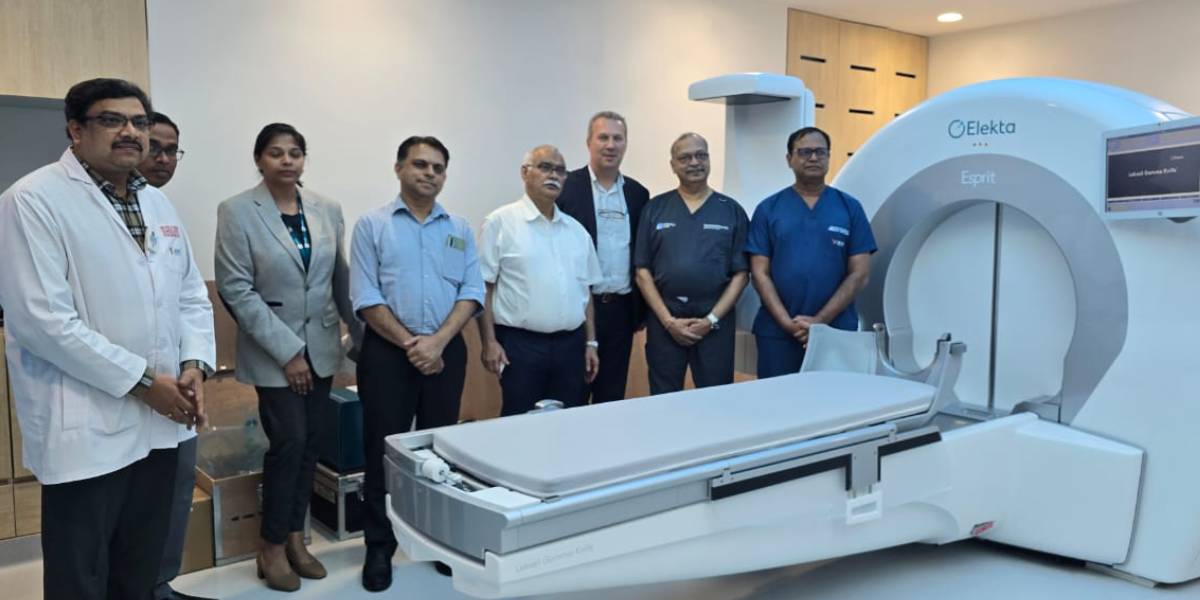Published May 17, 2025 | 7:00 AM ⚊ Updated May 17, 2025 | 7:00 AM

A team at KIMS Hospital near the Gamma Knife facility.
Synopsis: KIMS Hospital in Hyderabad launched a state-of-the-art facility offering a non-invasive alternative to traditional brain surgery. Using focused beams of energy instead of a scalpel, this technique precisely targets the problem areas inside the brain while leaving the healthy parts untouched.
Imagine being treated for a serious brain condition without undergoing surgery. No cuts, no stitches, no pain — and you can go home the very same day. That’s now a reality for patients in Hyderabad, thanks to a new medical advancement that’s transforming the treatment of brain disorders.
KIMS Hospital has launched a state-of-the-art facility in the city, offering a non-invasive alternative to traditional brain surgery. Using focused beams of energy instead of a scalpel, this technique precisely targets the problem areas inside the brain while leaving the healthy parts untouched.
The new centre brings this world-class technology, the Gamma Knife, to Hyderabad for the very first time, offering hope to patients who might otherwise face risky surgery, longer recovery times, and potential complications. Instead, they now have access to a faster, safer, and much more comfortable option.
The treatment, recognised internationally for its accuracy and safety, uses concentrated radiation to reach abnormalities deep inside the brain. Guided by detailed brain scans, the system delivers hundreds of small beams from different angles that meet at a common spot to treat the affected area. The rest of the brain remains unharmed. Most procedures are done in a few hours, with no need to stay in the hospital overnight.
This technology is especially useful for patients with conditions like brain tumours (whether cancerous or non-cancerous), tangled blood vessels in the brain (called AVMs), pituitary tumours, acoustic neuromas, and nerve disorders such as trigeminal neuralgia or epilepsy.
It also opens doors for patients who are not fit for regular surgery, such as the elderly or those with other health concerns, or when a tumour is in a location that’s too risky to operate on.
“This is a major step forward in how we treat complex brain conditions,” said Dr Manas Panigrahi, Senior Consultant Neurosurgeon at KIMS Hospital, in a statement. “With this non-invasive approach, we can reach delicate areas of the brain with incredible precision, and most importantly, with very little disruption to the patient’s life.”
Dr Bollineni Bhaskar Rao, Chairman and Managing Director of KIMS Hospital, emphasised the importance of this launch: “We are proud to bring one of South India’s most advanced brain treatment facilities to Hyderabad. This technology is a reflection of our commitment to putting patient safety, precision, and comfort at the heart of healthcare.”
The hospital said that the goal is not just to treat patients from Hyderabad, but also to serve those coming from across Telangana, Andhra Pradesh, and even other parts of India and nearby countries.
For many cancer patients, the moment they hear the words “it has spread to the brain” can be one of the most frightening. Brain metastases — when cancer travels from other parts of the body to the brain — are notoriously difficult to treat. But thanks to a remarkable medical advancement, there is now a safer, faster, and less invasive option that’s changing lives: Gamma Knife treatment.
The hospital said that despite the name, there’s no knife involved at all. The Gamma Knife is a highly advanced, non-surgical way to treat brain conditions using focused beams of radiation.
These beams act like invisible scalpels, targeting and destroying tumours with incredible precision — without making a single cut.
What sets Gamma Knife apart is its ability to treat multiple brain tumours in a single session. This is especially important for patients with metastatic cancer, where tumours can appear in more than one location.
Instead of undergoing surgery after surgery or weeks of radiation, many can complete treatment in just a few hours — and go home the same day.
The patient arrives in the morning, stays awake through the procedure, and goes home by evening. Before the treatment begins, doctors use detailed brain scans (like MRI or CT) to map the exact location of the tumours. A custom-fitted frame or mask keeps the head still while up to 192 tiny beams of radiation are directed at the tumour sites. These beams are harmless on their own, but they all meet at one precise point in the brain — delivering a strong dose exactly where it’s needed, and nowhere else.
That precision is one of the biggest benefits. Traditional radiation can sometimes affect healthy brain tissue, leading to side effects like memory loss or fatigue. Gamma Knife minimises that risk, with studies showing that over 90 percent of surrounding healthy tissue is protected. This means fewer side effects, less damage, and a better quality of life for patients.
The hospital also said that, importantly, there’s no incision, no blood loss, and no need for general anaesthesia. And for many, there’s also no hospital stay. Most patients return to their regular activities within a day or two. For those battling serious illnesses, that means more time at home, less time in the hospital, and more control over their treatment journey.
“The technology isn’t just limited to cancer. The Gamma Knife is also used to treat a variety of other brain conditions — from non-cancerous tumours to painful nerve disorders like trigeminal neuralgia and certain forms of epilepsy. It’s precise, safe, and effective — even in patients who might not be healthy enough for traditional surgery,” said the hospital in a statement.
They also added that since its introduction, over a million people worldwide have been treated using the Gamma Knife. In India alone, more than 8,000 procedures are performed every year. Success rates are high — up to 90 percent in some conditions — and serious complications are rare, with less than two percent of patients reporting significant side effects.
(Edited by Muhammed Fazil.)

